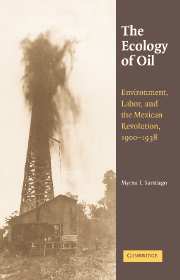Book contents
- Frontmatter
- Dedication
- Contents
- List of Maps, Figures, Tables, and Appendices
- Acknowledgments
- Introduction
- PART ONE THE HUASTECA BEFORE OIL
- PART TWO THE ECOLOGY OF OIL
- 2 Controlling the Tropical Forest: The Shift in Land Tenure Patterns
- 3 The Anatomy of Progress: Changing Land Use Patterns
- 4 “Masters of Men, Masters of Nature”: Social Change in the Huasteca
- PART THREE CHALLENGING THE ECOLOGY OF OIL
- Conclusion
- Epilogue
- Appendices
- A Note on the Sources
- Archives Consulted
- Selected Bibliography
- Index
2 - Controlling the Tropical Forest: The Shift in Land Tenure Patterns
from PART TWO - THE ECOLOGY OF OIL
Published online by Cambridge University Press: 05 March 2015
- Frontmatter
- Dedication
- Contents
- List of Maps, Figures, Tables, and Appendices
- Acknowledgments
- Introduction
- PART ONE THE HUASTECA BEFORE OIL
- PART TWO THE ECOLOGY OF OIL
- 2 Controlling the Tropical Forest: The Shift in Land Tenure Patterns
- 3 The Anatomy of Progress: Changing Land Use Patterns
- 4 “Masters of Men, Masters of Nature”: Social Change in the Huasteca
- PART THREE CHALLENGING THE ECOLOGY OF OIL
- Conclusion
- Epilogue
- Appendices
- A Note on the Sources
- Archives Consulted
- Selected Bibliography
- Index
Summary
Mientras trabajaba en Zacamixtle, una vez llegó un norteamericano, empleado del departamento de terrenos de una de tantas compañnías petroleras, se alojó en mi campamento unos cuantos días y después desapareció sin decir a dónde iba, ni qué hacía, para regresar pasadas varias semanas, con la barba crecida, mugroso y enlodado…se trataba de un agente de la compañnía que andaba en busca de un campesino, para lograr que le vendiera las regalías correspondientes a su propiedad…de los tantos que con engaõnos… obtenía los derechos correpondientes a los propietarios cuando el petróleo brotara, disfrutando de una ganancia que los convertía en rentistas, sin haber hecho otra inversión, que la pérdida de varios días o semanas.
Manuel Mesa Andraca, 1981Although the hacendados did manage to increase their landholdings during the Porfiriato, they did not succeed in breaking the Indians' “negative communion” with the tropical rainforest of the Huasteca. The oilmen from the United States and Britain did. They took two decades, from 1900 to 1920. Dispensing pesos as readily as the hacendados had dispensed bullets, the oilmen achieved what had eluded Mexican elites for at least a century: the wholesale alienation of indigenous land and conversion of the lush forest into a revenue stream. But the native population was not the only one who lost control of the rainforest. The hacendados did, too. Eagerly entering into deals with the oil companies, they found themselves shortchanged when the wells started producing oil like sprinklers on a lawn. Both groups reacted to the changes. In all cases, the protesters extracted small and large sums of money from the companies, but there was no stopping the oil entrepreneurs. They created a true real estate market out of the rainforest, commodifying it thoroughly for the first time in its history. Thus, the foreign oilmen achieved in two decades what Mexican elites had failed to do in a century: a radical shift in land tenure patterns. That was the first major transformation in the ecology of oil.
- Type
- Chapter
- Information
- The Ecology of OilEnvironment, Labor, and the Mexican Revolution, 1900–1938, pp. 61 - 100Publisher: Cambridge University PressPrint publication year: 2006



